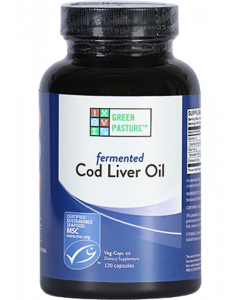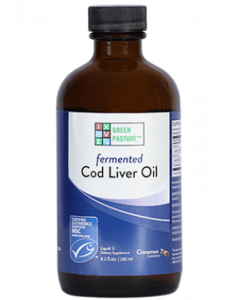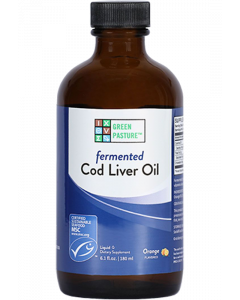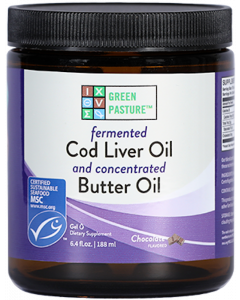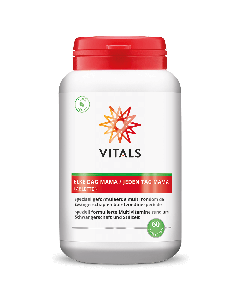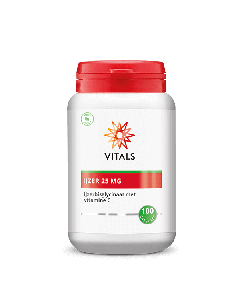Pregnancy overview
Everything starts with ovulation, where the ovocyte (the egg) matures and is released from the ovary, then the fertilization of the egg creates a zygote (fusion of egg and sperm). Cells divide over and over until and it is implanted into the endometrium. When this doesn't occur the endometrium is shed, which is known as the period or bleeding.
The uterus is usually a pelvic organ but during pregnancy, it grows into the stomach area or abdomen. The cardiovascular system is forced to increase its capacity due to an expanding uterus, growing fetus and obviously the needs of the pregnant mother. Blood volume increases by 30-50% and heart rate increases by about 20 beats per minute, the heart also grows in size and returns to normal follow pregnancy.
Next, is the bladder, with the increase in blood flow due to increased heart rate and blood volume there is increased urinary output. Again, there is a temporal enlargement of the kidneys and urinary system to handle the extra workload. This also returns to normal after pregnancy.
Pregnancy affects nearly every organ system, some others include, gastrointestinal tract (hormone levels affect smooth muscle contraction and can lead to constipation), respiratory system (pressure on the lower diaphragm, leading to breathing difficulties) and the mood-regulating systems (irritability, mental fogginess, fatigue etc.). (Source: NCBI)
See the figure below for an overview.
The stages of pregnancy are divided into three, 3-month blocks called trimesters:
- 1st Trimester: Conception to 12 weeks
- 2nd Trimester: Week 13 to week 27
- 3rd Trimester: Week 28 until birth
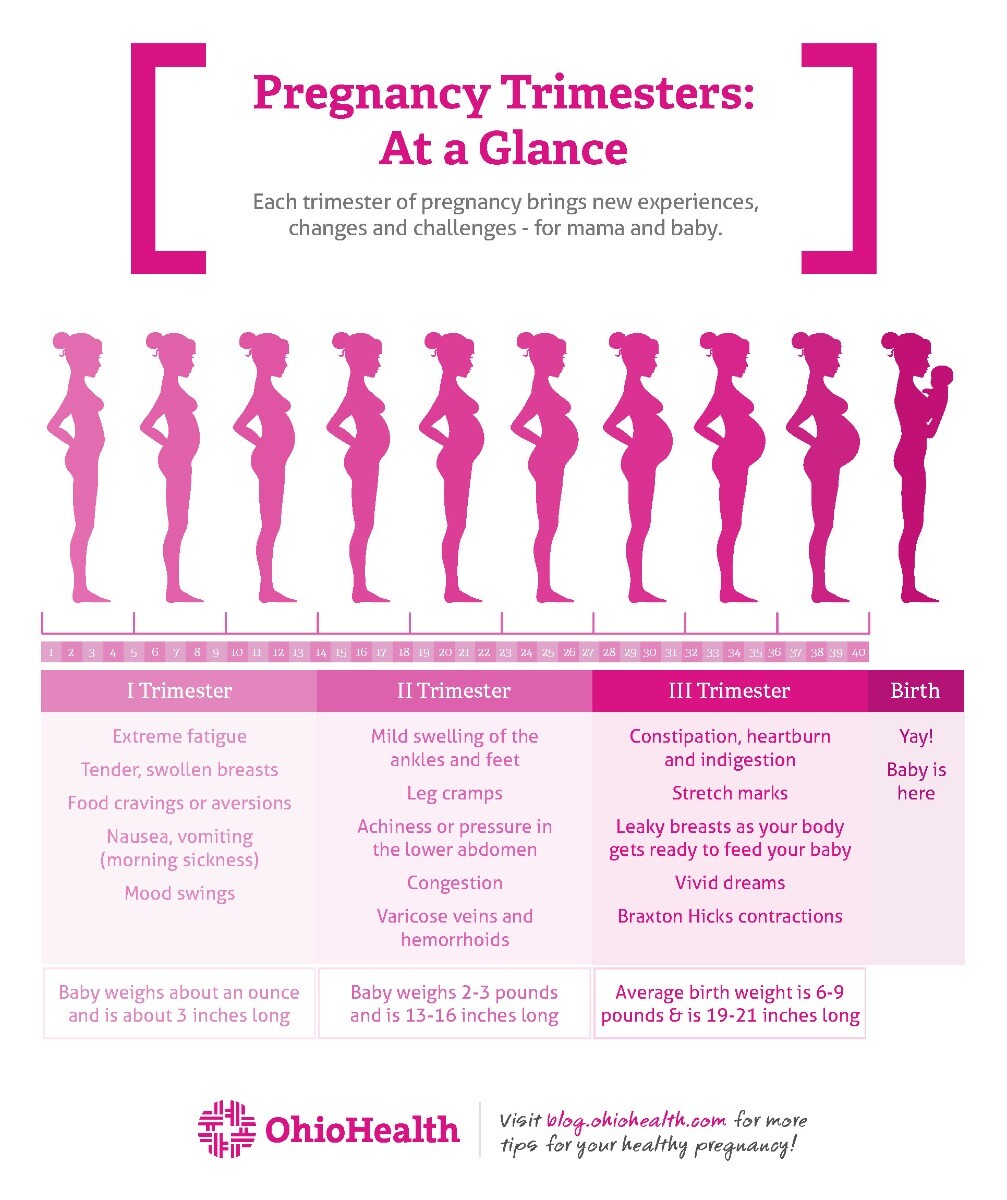
(Source: OhioHealth)
How can I have a healthy pregnancy: research highlight
Diet and Lifestyle Before and During Pregnancy – Practical Recommendations of the Germany-wide Healthy Start – Young Family Network
Below are highlights taken from the paper. Click on the link below to read more about the basis of these recommendations.
- General Recommendation: "Professional groups who care for women of childbearing age, particularly women with a concrete wish to have children, as well as pregnant women must encourage and counsel them to follow a balanced diet, physical activity and a healthy lifestyle."
- Bodyweight: "Even before pregnancy, the optimal adjustment of body weight to a normal weight is desirable."
- Nutrient requirements: "Energy requirements increase only slightly over the course of pregnancy. Pregnant women should increase their energy intake only slightly (up to about 10%) and not until the last few months of pregnancy."
- Folic Acid: "In addition to a balanced diet, women planning a pregnancy must take 400 µg of folic acid daily or equivalent doses of other folates in the form of a supplement."
- Iodine: "In addition to a balanced diet, pregnant women must take a daily supplement of 100 (up to 150) µg iodine. Women with thyroid disorders must consult their physician before supplementation."
- Exercise: "Pregnant women should be moderately physically active for at least 30 minutes at least 5 days a week and preferably daily. Moderately active means that conversation is still possible during sporting activity (talk test)."
- Alcohol: "Women who are planning a pregnancy and pregnant women must avoid alcohol."
- Caffeine: "Pregnant women should drink caffeinated beverages only in moderate amounts."
- Smoking: "Pregnant women must avoid smoking and stay in rooms where people are smoking or have smoked."
Conclusion: "balanced diet, regular exercise and a healthy lifestyle are particularly important before and during pregnancy. The time before conception and the first 1000 days of the childʼs life provide an opportunity to lay the foundations for the health of the child, the expectant mother and the family. This potential for prevention should be recognised and utilised on a broad basis. The revised recommendations presented here provide uniform, practical and up-to-date knowledge-based recommendations for pregnancy and also for women/couples wishing to have a child."
(Source: NCBI).
Pregnancy complications
Over 40% of pregnancies are unplanned. The main issue with an unplanned pregnancy is most women miss out on essential prenatal (before birth) care. For example, it is stated, "All women of reproductive age should receive folate at 400 mcg to 800 mcg to prevent neural tube defects" (Source: NCBI).
Physical activity and pregnancy?
First, exercise during pregnancy is completely fine and even encouraged, once the exercise is appropriate and suitable for you and your specific context. As always consult your healthcare professional for advice on specific exercises.
Below is an infographic from the American College of Sports Medicine on Pregnancy and physical activity. Read more at the link below.
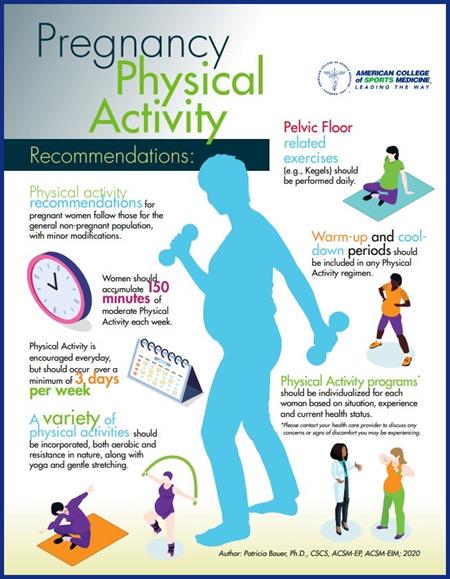
(Source: ACSM)
Other Lifestyle Factors
General principles of a healthy, balanced diet rich in omega-3, vitamins and minerals, and fibre are associated with overall health. Limiting stressors or avoid completely if possible such as excessive alcohol intake, smoking, being overweight or obese, poor sleep quantity and quality and personal and professional stress.
Consume plenty of fruit & vegetables. Supplementation may be beneficial to fill the gaps as discussed in "additional considerations" below.
Consult your physician/doctor on prenatal care (usually consists of various micronutrients, vitamin B12, folic acid and vitamin D at a minimum).
Additional Considerations
While consumption of most nutrients through natural or fortified foods is preferred, some nutrients may occasionally need supplementation. Especially for restrictive diets or those that lack variety.
As a general rule try to consume 5-7 servings of fruit and vegetables a day. Importantly, if you do not consume animal products you should consult your healthcare professional to discuss and consider a vitamin B12 supplement. Vitamin D is another risk-nutrient and should be supplemented from October-March in countries of northern latitude (north of the equator, Ireland, UK, Denmark, etc.). However, discuss with your doctor as pregnancy may warrant different dosages and in some cases may not be needed at all (Source: NCBI, MDPI).
Want to learn more?
Here at Plent, we are different from most other supplement retailers out there. We are committed to consumer education and empowerment, and transparency and quality assurance of all our own supplements. For this reason, we want all our customers to have a full and rounded understanding of the world of supplementation. If you would like to read more about pregnancy, check out the links below:
Video & Articles
 Green Pasture - High Vitamin Butter Oil - X-Factor gold - Natural - 188ml GelOut of stockSpecial Price € 35.95 € 45.95
Green Pasture - High Vitamin Butter Oil - X-Factor gold - Natural - 188ml GelOut of stockSpecial Price € 35.95 € 45.95 Sunwarrior - Omega-3 | Vegan DHA & EPA - 60 softgelsShipped todaySpecial Price € 38.66 € 42.95(Starting at € 38,66 p/u)
Sunwarrior - Omega-3 | Vegan DHA & EPA - 60 softgelsShipped todaySpecial Price € 38.66 € 42.95(Starting at € 38,66 p/u)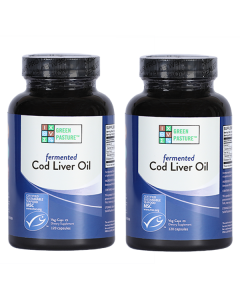 Green Pasture - Blue Ice™ Fermented Cod Liver Oil – 3 x 120 caps.Shipped today€ 110.26
Green Pasture - Blue Ice™ Fermented Cod Liver Oil – 3 x 120 caps.Shipped today€ 110.26 Green Pasture - Fermented Cod Liver Oil/Butter Oil - 3 x 120 caps.Shipped today€ 124.06
Green Pasture - Fermented Cod Liver Oil/Butter Oil - 3 x 120 caps.Shipped today€ 124.06 Plantforce - Vegan Omega-3 Algae Oil - 3x 120 softgels Bundle DealShipped today€ 94.37
Plantforce - Vegan Omega-3 Algae Oil - 3x 120 softgels Bundle DealShipped today€ 94.37



